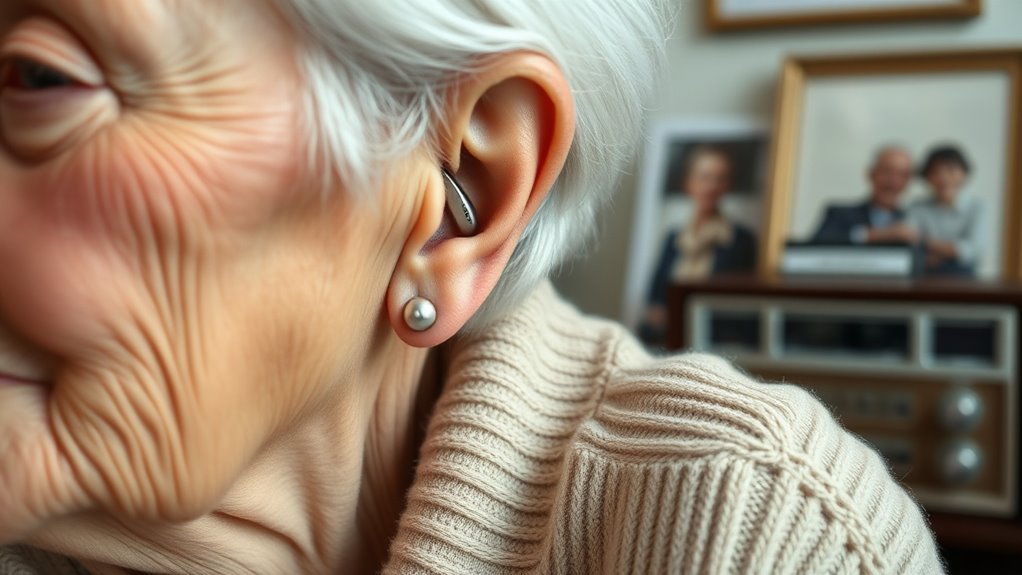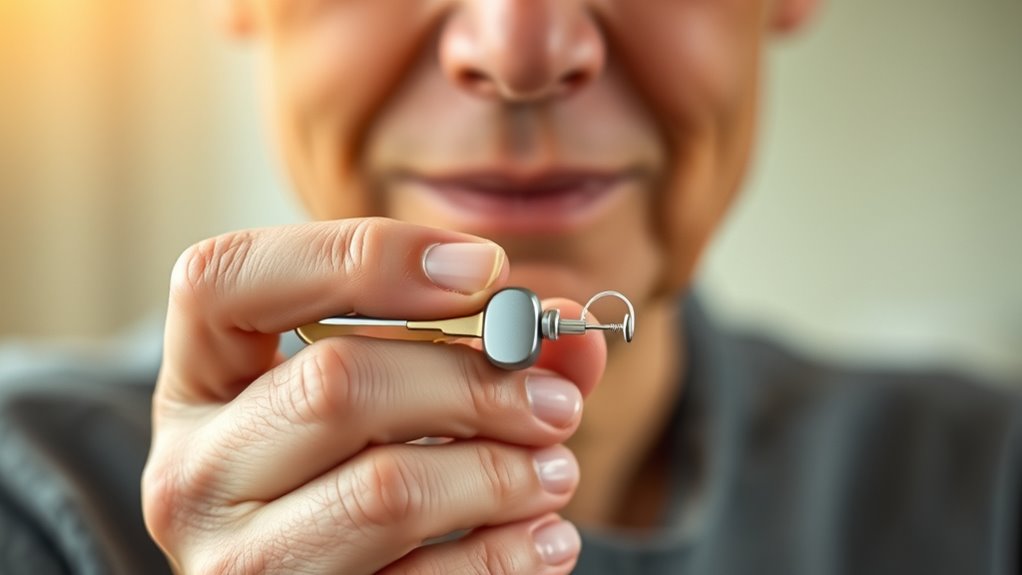Many older adults believe myths about hearing aids, like thinking they’re only for severe loss or will make them look old. Some worry they’re ineffective or too expensive, while others think they’ll depend on devices forever or that they’re hard to use. These ideas aren’t true, as modern hearing aids are discreet, affordable, and designed for easy use. Keep exploring to discover the facts that can help you hear better and stay confident.
Key Takeaways
- Many believe hearing aids are only for severe loss, but they benefit mild to moderate hearing issues as well.
- Stereotypes persist that hearing aids are bulky or stigmatizing, but modern devices are discreet and stylish.
- Older adults often think hearing loss is inevitable or unfixable, though many conditions are treatable with early intervention.
- There’s a misconception that hearing aids fully restore natural hearing, but they mainly amplify sounds and assist with clarity.
- Cost concerns lead some to believe hearing aids are unaffordable, despite advances in affordable, customizable options and financial assistance programs.

Audien Atom One OTC Hearing Aids – Wireless, Rechargeable, and Comfortable | Clear Sound in a Small, Discreet Design for Seniors & Adults with Hearing Loss
Hear What Matters Most: Hearing isn’t one-size-fits-all. That’s why our adjustable frequency system lets you personalize your sound…
As an affiliate, we earn on qualifying purchases.
As an affiliate, we earn on qualifying purchases.
Hearing Aids Are Only for Severe Hearing Loss

Many people believe that hearing aids are only necessary for severe hearing loss, but that’s a misconception. You might think only significant hearing issues warrant help, but mild or moderate loss can benefit from hearing aids too. Some have cost misconceptions, believing they’re too expensive or unnecessary for minor issues. In reality, modern hearing aids are more affordable than ever, especially with options tailored to different needs. Aesthetic concerns also play a role; many worry they’ll look old or different. Today’s devices are sleek, discreet, and designed to blend seamlessly with your appearance. Hearing aids aren’t just for severe loss—they improve your quality of life at any stage, making conversations clearer and reducing frustration. Audiometric Testing is essential for accurate diagnosis and determining the appropriate level of assistance. Don’t let misconceptions hold you back from exploring options that could truly help.

Audien Atom One OTC Hearing Aids – Wireless, Rechargeable, and Comfortable | Clear Sound in a Small, Discreet Design for Seniors & Adults with Hearing Loss
Hear What Matters Most: Hearing isn’t one-size-fits-all. That’s why our adjustable frequency system lets you personalize your sound…
As an affiliate, we earn on qualifying purchases.
As an affiliate, we earn on qualifying purchases.
Hearing Aids Will Make Me Look Old or Different

Worrying that hearing aids will make you look old or different is a common concern, but modern designs have changed that perception. Many style misconceptions suggest that hearing aids are bulky or obvious, but today’s models are sleek and discreet. You can choose from invisible in-the-ear devices or minimalist behind-the-ear styles that blend seamlessly with your appearance. Appearance concerns often stem from outdated stereotypes, but technology has advanced to prioritize aesthetics without sacrificing quality. With so many options available, you don’t have to worry about looking different or aging yourself. Instead, you can focus on hearing better while maintaining your personal style. Modern hearing aids are designed to be both functional and fashionable, helping you feel confident and comfortable. Additionally, advancements in hearing aid technology have made these devices more visually appealing and easier to personalize to individual preferences.

Flaygo Hearing Aids for Seniors, OTC Hearing Aids for People with Hearing Loss, Sound Quality Restoration, Intelligent Noise Reduction, Standby 80h, One-Button Operation, Comfortable Wearing,Beige
Digital Chip, HIFI Sound Quality:Hearing amplifiers have a built-in 16-channel digital chip with intelligent noise reduction technology that…
As an affiliate, we earn on qualifying purchases.
As an affiliate, we earn on qualifying purchases.
Hearing Aids Are Not Effective for Better Hearing

Many believe hearing aids aren’t effective, but technological limits and the complexity of hearing loss play a role. Your results can vary based on these factors and your specific condition. Managing expectations helps you understand what hearing aids can truly offer.
Technological Limitations Persist
Despite advances in hearing aid technology, these devices still struggle to fully restore natural hearing. Wireless connectivity has improved, allowing better streaming of sound from your devices, but it doesn’t replicate the complexity of real-world listening. Battery technology has also advanced, offering longer-lasting power, yet frequent recharging or battery replacements remain necessary. These limitations mean hearing aids can enhance certain sounds but often fall short in noisy environments or when trying to distinguish speech from background noise. They don’t perfectly mimic the intricate processes of natural hearing, so you might still find some situations challenging. While technology has made significant progress, these devices aren’t yet capable of fully overcoming the complexities of hearing loss. Maximize Your Hearing Aid Effectiveness by working closely with an audiologist to optimize device settings and ensure proper fit.
Hearing Loss Is Complex
Hearing loss is more complex than many people realize, and while hearing aids can help, they don’t fully restore natural hearing. Modern hearing aid technology has advanced, but it mainly amplifies sounds rather than addressing the brain’s auditory processing. Your brain still needs to interpret these sounds, especially in noisy environments. Hearing aids improve clarity for many users, but they don’t eliminate all challenges associated with auditory processing difficulties. This means that even with the latest devices, you might still struggle to understand conversations or distinguish sounds in certain settings. Recognizing the complexity of hearing loss helps set realistic expectations. It’s important to understand that hearing aids are tools for amplification, not a complete fix for the intricate process of hearing and comprehension. Additionally, understanding auditory processing is essential to grasp why hearing aids alone may not resolve all hearing challenges.
Expectations May Vary
While hearing aids can considerably improve your ability to hear in certain situations, it’s important to understand that they don’t guarantee better hearing in all environments. Your experience with them may vary based on several factors.
- Social engagement might still feel challenging in noisy settings, even with the latest technology.
- Technological advancements continue to improve sound clarity, but they can’t restore perfect hearing.
- Your expectations should be realistic; hearing aids can enhance communication but won’t eliminate all hearing difficulties.
Understanding these limits helps set practical goals and prevents disappointment. Remember, adjustments and patience are key to maximizing your hearing aid benefits in different social and environmental contexts.

Karthus Hearing Aids, Rechargeable Hearing Aids for Seniors with Hearing Loss, Noise Cancelling & Clear Sound, Comfort & Invisible, 100H Long Battery, 7 Level Volume, One-Button Operation, Skin
🔊 Clear sound: 40db ultra-high gain and 16-channel dsp deliver natural, distortion-free audio for conversations or tv. the…
As an affiliate, we earn on qualifying purchases.
As an affiliate, we earn on qualifying purchases.
I Can’t Afford Hearing Aids

Many people feel that hearing aids are too expensive and out of reach. You might find that cost concerns limit your access, especially if insurance doesn’t cover the full price. However, there are options to help make hearing aids more affordable for you. Exploring affordable hearing aid options can reveal solutions that fit within your budget.
Cost Concerns Limit Access
For many people, the high cost of hearing aids makes them seem overwhelming. This financial barrier often prevents you from seeking help. However, there are ways to improve affordability:
- Check if your insurance coverage offers any benefits for hearing aids, as some plans now include partial coverage.
- Explore affordability options like payment plans or discounts offered by providers.
- Research community programs or non-profits that assist with costs for eligible individuals.
- Consider hearing aid insurance policies that provide coverage for certain expenses related to hearing devices.
Understanding these options can help you overcome cost concerns. While upfront costs may seem daunting, knowing what financial assistance is available can make hearing aids more accessible. Don’t let expense stop you from improving your hearing health.
Insurance May Not Cover Costs
Even if you want to get hearing aids, insurance may not cover the costs, leaving you to pay out-of-pocket. Many people worry about insurance coverage and the expense of hearing aids, which can cause hesitation. It’s important to understand that coverage varies widely, and some plans may offer limited or no assistance. To help clarify, consider this table:
| Insurance Coverage | Typical Cost Concerns | Options to Reduce Costs |
|---|---|---|
| Limited or none | High prices often | Look for discounts or grants |
| Varies by plan | Out-of-pocket expenses | Explore financing options |
| May cover parts | Hidden fees | Shop for affordable models |
Knowing your options can ease cost concerns and help you access the hearing care you need. Additionally, understanding insurance coverage can help you make informed decisions about your hearing health.
Hearing Aids Will Make Background Noise Worse

A common concern is that hearing aids will make background noise worse, but modern technology has considerably improved how they handle noisy environments. Today’s hearing aids use advanced features to enhance your hearing clarity and reduce unwanted background noise. Here are three ways they achieve this:
- Noise reduction algorithms that filter out distracting sounds.
- Directional microphones that focus on the speaker in front of you.
- Adaptive settings that adjust automatically based on your environment.
- These innovations incorporate high-pressure technology to better manage various sound levels and improve overall listening comfort.
These innovations help you hear conversations more clearly without the background noise overwhelming your listening experience. Instead of making background noise worse, modern hearing aids improve your ability to distinguish speech and enjoy clearer sound quality in even the loudest settings.
Once I Start Using Hearing Aids, I’ll Depend on Them Forever

Many worry that once they start using hearing aids, they’ll become dependent on them for life. The truth is, hearing aids don’t create long-term reliance or ongoing dependency. They’re tools designed to improve your hearing temporarily, not to replace your natural abilities forever. As your hearing improves and your confidence grows, you might find you need them less often or even stop using them when your hearing stabilizes. Regular checkups can help adjust your devices so they work best without fostering dependence. Remember, hearing aids are there to support you, not to control your hearing. With proper use, they can enhance your quality of life without making you reliant on them permanently.
Hearing Aids Are Difficult to Use and Maintain

Although some people worry that hearing aids are complicated to use and maintain, modern designs have made them much more user-friendly. Today’s hearing aids feature intuitive controls and sleek designs that are easy to operate. To keep them working well, follow simple maintenance tips, such as cleaning the device regularly, replacing batteries when needed, and avoiding moisture exposure. Here are three key points:
- Use a soft, dry cloth to clean the hearing aid daily.
- Keep batteries fresh and replace them promptly.
- Store your hearing aid in a dry, safe place when not in use.
- Incorporating cultural awareness into care routines can help address different user needs and preferences.
With these maintenance tips, you’ll find that caring for your hearing aids is straightforward. The user friendly design ensures you enjoy better hearing without hassle or frustration.
Only Elderly People Wear Hearing Aids

People often assume hearing aids are only for older adults, but that’s a misconception. Modern technology has made hearing aids smaller, more discreet, and suitable for a wide age range. Younger people with hearing difficulties or those exposed to loud environments also wear them. Social perceptions can lead some to believe hearing aids are a sign of aging, but that’s changing as more individuals realize their benefits. Hearing aids today are designed to blend seamlessly with your lifestyle, regardless of age. Increasing awareness and advancements in technology help break down the outdated idea that only seniors use them. Whether you’re in your 30s or 80s, hearing aids can improve your quality of life without anyone knowing you’re wearing them. Additionally, the design and technology of hearing aids have advanced significantly, making them a practical and accessible option for many.
Hearing Loss Is Just a Part of Aging and Cannot Be Fixed

Hearing loss is often dismissed as an inevitable part of aging, but that belief is misleading. Many fall for age-related misconceptions, thinking hearing issues can’t be improved. The truth is, hearing loss isn’t just a fact of getting older; it’s often treatable. Here are three common misunderstandings:
- Hearing loss is permanent and can’t be fixed.
- Only older adults experience hearing problems.
- Hearing aids are unnecessary or ineffective.
These misconceptions prevent you from seeking help early. Modern techniques and hearing aids can considerably improve your hearing, regardless of age. Don’t buy into the idea that aging automatically means loss of hearing. With the right treatment, you can regain clarity and connection in your conversations. Hearing loss is often treatable and understanding that it’s not an unavoidable part of aging can encourage more individuals to seek assistance early.
Frequently Asked Questions
Can Hearing Aids Improve My Quality of Life Beyond Hearing?
Yes, hearing aids can substantially improve your quality of life beyond just hearing. By enhancing your hearing, they boost mental health by reducing feelings of isolation and frustration. You’ll find it easier to engage socially, which can lift your mood and strengthen relationships. Overall, hearing aids help you stay connected and active, making everyday experiences more enjoyable and less stressful.
Are There Discreet or Nearly Invisible Hearing Aid Options Available?
Did you know that over 70% of hearing aid users prefer discreet designs? Yes, there are nearly invisible models and discreet options available now. These designs fit comfortably inside your ear or behind it, making them hardly noticeable. With advances in technology, you can enjoy improved hearing without sacrificing style or confidence. So, whether you want discreet designs or invisible models, there’s a perfect solution to suit your needs.
How Quickly Can I Expect to Notice Improvements With Hearing Aids?
You can typically notice initial benefits within a few days to a couple of weeks, depending on your adaptation timeline. As you wear your hearing aids regularly, your brain gradually adjusts, and you’ll start experiencing clearer conversations and improved sound awareness. Patience is key, and consistent use helps speed up the adaptation process, so stay committed, and you’ll soon enjoy the full advantages of your hearing aids.
Do Hearing Aids Require Frequent Replacement or Upgrades?
Hearing aids are built for durability, often lasting about 3 to 7 years with proper care. You typically don’t need frequent upgrades, but technology advances may prompt replacements every few years. Regular check-ups ensure your hearing aid stays in top shape, and upgrades are optional to benefit from newer features. Overall, their durability and upgrade frequency depend on usage, maintenance, and personal preferences.
Are There Programs to Help Reduce the Cost of Hearing Aids?
You can find programs that help cut costs on hearing aids, so don’t throw in the towel just yet. Many insurance plans now offer coverage or financial assistance for hearing aids, making them more accessible. Check with local clinics, government programs, or non-profits, as they often have subsidies or discounts. Remember, every penny saved is a step toward better hearing and a brighter outlook.
Conclusion
Don’t let these myths shroud your understanding like fog over a lighthouse. Hearing aids aren’t just for the severe or the old—they’re your guiding light through clearer conversations and richer moments. Imagine breaking free from the shadows of doubt, stepping into a world where sound is vibrant and accessible. Embrace the truth, and let your journey to better hearing be as bright and limitless as the dawn.









